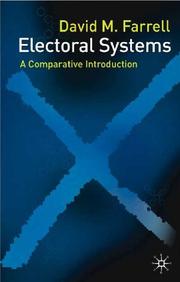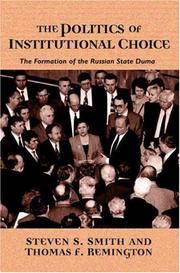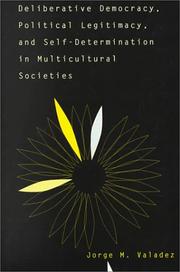| Listing 1 - 10 of 10 |
Sort by
|
Book
ISBN: 1281944351 9786611944353 0191530417 Year: 2001 Publisher: Oxford ; New York : Oxford University Press,
Abstract | Keywords | Export | Availability | Bookmark
 Loading...
Loading...Choose an application
- Reference Manager
- EndNote
- RefWorks (Direct export to RefWorks)
This work continues the series of election data handbooks published by OUP. It presents a compendium of electoral data for all the 62 states in Asia, Australia and Oceania from their independence to the beginning of the 21st century.
Elections --- Representative government and representation --- Asia --- Politics and government. --- Parliamentary government --- Political representation --- Representation --- Self-government --- Constitutional history --- Constitutional law --- Political science --- Democracy --- Republics --- Suffrage --- Electoral politics --- Franchise --- Polls --- Politics, Practical --- Plebiscite --- Political campaigns

ISBN: 0333801628 033380161X 9780333801611 9780333801628 Year: 2001 Publisher: Basingstoke : Palgrave Macmillan,
Abstract | Keywords | Export | Availability | Bookmark
 Loading...
Loading...Choose an application
- Reference Manager
- EndNote
- RefWorks (Direct export to RefWorks)
Elections. --- Representative government and representation. --- Elections --- Gouvernement représentatif --- Representative government and representation --- #SBIB:324H42 --- Parliamentary government --- Political representation --- Representation --- Self-government --- Electoral politics --- Franchise --- Polls --- Politieke structuren: verkiezingen --- Constitutional history --- Constitutional law --- Political science --- Democracy --- Republics --- Suffrage --- Politics, Practical --- Plebiscite --- Political campaigns --- Élections --- Système électoral --- Études comparatives --- Élections --- Système électoral --- Études comparatives

ISBN: 0754616045 Year: 2001 Publisher: Aldershot ; Brookfield, VT : Ashgate,
Abstract | Keywords | Export | Availability | Bookmark
 Loading...
Loading...Choose an application
- Reference Manager
- EndNote
- RefWorks (Direct export to RefWorks)
Democracy --- Political science --- -Representative government and representation --- #SBIB:324H40 --- #SBIB:35H100 --- #SBIB:021.IO --- Parliamentary government --- Political representation --- Representation --- Self-government --- Constitutional history --- Constitutional law --- Elections --- Republics --- Suffrage --- Administration --- Civil government --- Commonwealth, The --- Government --- Political theory --- Political thought --- Politics --- Science, Political --- Social sciences --- State, The --- Equality --- Representative government and representation --- Decision making --- -Costs --- Politieke structuren: algemeen --- Bestuurlijke organisatie: algemene werken --- Democratie --- Democratie. --- Decision making&delete& --- Costs

ISBN: 9004121943 9004397841 Year: 2001 Publisher: Leiden Brill
Abstract | Keywords | Export | Availability | Bookmark
 Loading...
Loading...Choose an application
- Reference Manager
- EndNote
- RefWorks (Direct export to RefWorks)
Civil service --- Bureaucracy --- Capitalism --- Representative government and representation --- #SBIB:35H2110 --- Parliamentary government --- Political representation --- Representation --- Self-government --- Constitutional history --- Constitutional law --- Political science --- Democracy --- Elections --- Republics --- Suffrage --- Market economy --- Economics --- Profit --- Capital --- Interorganizational relations --- Public administration --- Organizational sociology --- Bureaucrats --- Career government service --- Civil servants --- Government employees --- Government service --- Public employees --- Public service (Civil service) --- Public officers --- Public service employment --- Personeelsmanagement: openbaar ambt: algemeen --- Law and legislation --- Legal status, laws, etc. --- Bureaucracy. --- Capitalism. --- Civil service. --- Representative government and representation. --- Overheidsmanagement: personeel --- Overheidsmanagement: personeel.

ISBN: 0691057362 0691057370 1400814715 1400823943 140081815X Year: 2001 Publisher: Princeton (N.J.) Princeton university press
Abstract | Keywords | Export | Availability | Bookmark
 Loading...
Loading...Choose an application
- Reference Manager
- EndNote
- RefWorks (Direct export to RefWorks)
Events in Russia since the late 1980s have created a rare opportunity to watch the birth of democratic institutions close at hand. Here Steven Smith and Thomas Remington provide the first intensive, theoretically grounded examination of the early development of the State Duma, the lower house of the Russian Federation's parliament created by the 1993 constitution. They offer an integrated account of the choices made by the newly elected members of the Duma in establishing basic operating arrangements: an agenda-setting governing body, a standing committee system, an electoral law, and a party system. Not only do these decisions promise to have lasting consequences for the post-communist Russian regime, but they also enable the authors to test assumptions about politicians' goals from the standpoint of institutional theory. Smith and Remington challenge in particular the notion, derived from American contexts, that politicians pursue a single, overarching goal in the creation of institutions. They argue that politicians have multiple political goals--career, policy, and partisan--that drive their choices. Among Duma members, the authors detect many cross currents of interests, generated by the mixed electoral system, which combines both single-member districts and proportional representation, and by sharp policy divisions and an emerging party system. Elected officials may shift from concentrating on one goal to emphasizing another, but political contexts can help determine their behavior. This book brings a fresh perspective to numerous theories by incorporating first-hand accounts of major institutional choices and placing developments in their actual context.
Legislative bodies --- Representative government and representation --- Parlements --- Gouvernement représentatif --- Russia (Federation). --- Russia (Federation) --- Russie --- Politics and government --- Politique et gouvernement --- -Representative government and representation --- -#SBIB:328H262 --- #SBIB:35H6020 --- Parliamentary government --- Political representation --- Representation --- Self-government --- Constitutional history --- Constitutional law --- Political science --- Democracy --- Elections --- Republics --- Suffrage --- Bicameralism --- Legislatures --- Parliaments --- Unicameral legislatures --- Estates (Social orders) --- Legislative power --- Instellingen en beleid: Rusland en het GOS --- Bestuur en beleid: nationale en regionale studies: Oost-Europa --- Russia (Federation). Federal'noe Sobranie. Gosudarstvennai︠a︡ Duma --- -Politics and government --- -Legislative bodies --- Gouvernement représentatif --- #SBIB:328H262 --- Gosduma (Russia : 1993- ) --- Russian State Duma (Russia : 1993- ) --- Duma (Russia : 1993- ) --- Gosudarstvennai︠a︡ Duma Rossiĭskoĭ Federat︠s︡ii --- Gosduma FS RF

ISBN: 0813391148 9780813391144 Year: 2001 Publisher: Boulder, Colo. Westview Press
Abstract | Keywords | Export | Availability | Bookmark
 Loading...
Loading...Choose an application
- Reference Manager
- EndNote
- RefWorks (Direct export to RefWorks)
Deliberative democracy. --- Legitimacy of governments. --- Minorities --- Multiculturalism. --- Representative government and representation. --- Self-determination, National. --- Civil rights. --- Political philosophy. Social philosophy --- Representative government and representation --- Multiculturalism --- Legitimacy of governments --- Self-determination, National --- Civil rights --- Deliberative democracy --- National self-determination --- Parliamentary government --- Political representation --- Representation --- Self-government --- Cultural diversity policy --- Cultural pluralism --- Cultural pluralism policy --- Ethnic diversity policy --- Governments, Legitimacy of --- Legitimacy (Constitutional law) --- Minority rights --- Discursive democracy --- Government policy --- Nationalism --- Nation-state --- Nationalities, Principle of --- Sovereignty --- Constitutional history --- Constitutional law --- Political science --- Democracy --- Elections --- Republics --- Suffrage --- Social policy --- Anti-racism --- Ethnicity --- Cultural fusion --- Consensus (Social sciences) --- Revolutions --- State, The --- General will --- Political stability --- Regime change --- Minorities - Civil rights

ISBN: 0140287930 Year: 2001 Volume: 1 Publisher: London Penguin
Abstract | Keywords | Export | Availability | Bookmark
 Loading...
Loading...Choose an application
- Reference Manager
- EndNote
- RefWorks (Direct export to RefWorks)
European union --- -Federal government --- -#SBIB:021.IO --- State governments --- Representative government and representation --- -Democracy --- -Constitutional history --- #SBIB:327.7H201 --- Constitutional history, Modern --- Constitutional law --- Constitutions --- History --- Division of powers --- Federal government --- Federal-provincial relations --- Federal-state relations --- Federal systems --- Federalism --- Powers, Division of --- Provincial-federal relations --- State-federal relations --- Political science --- Central-local government relations --- Decentralization in government --- Self-government --- Equality --- Republics --- Parliamentary government --- Political representation --- Representation --- Constitutional history --- Democracy --- Elections --- Suffrage --- Europese Unie: politieke theorie --- Law and legislation --- International relations. Foreign policy --- Political systems --- European Union --- -Political systems
Book
ISBN: 9050951864 9789050951869 Year: 2001 Publisher: Antwerpen Intersentia Rechtswetenschappen
Abstract | Keywords | Export | Availability | Bookmark
 Loading...
Loading...Choose an application
- Reference Manager
- EndNote
- RefWorks (Direct export to RefWorks)
Inhoud : Voorstelling van het onderzoek - De democratische staat en het legaliteitsbeginsel - Beginselen van demcratisch regelgeven in de rechtsleer, in de rechtspraak en in het wetgevingsbeleid - Stellingen en besluiten
Political philosophy. Social philosophy --- Legal theory and methods. Philosophy of law --- Législation --- Wetgeving --- Legislation --- Representative government and representation --- Legitimacy of governments --- Legislation. --- Representative government and representation. --- Legitimacy of governments. --- 321.151 --- 101 Wetgevingstheorie --- staat --- wetgeving --- politiek --- politieke geschiedenis --- belgie --- AA / International- internationaal --- 321.4 --- 342.3 --- 342.520 --- ALGEMEEN PUBLIEKRECHT V 2 --- V2 - Droit public général - Algemeen publiekrecht --- Democratie --(klassieke democratie politieke stelsels) --- etat --- legislation --- politique --- histoire politique --- belgique --- Democratie. --- Soevereiniteit. Regeringsstelsels. Delegatie, scheiding en evenwicht van de machten. --- Wetgevende macht: algemeenheden. --- 321.151 Democratie --(klassieke democratie politieke stelsels) --- Parliamentary government --- Political representation --- Representation --- Self-government --- Constitutional history --- Constitutional law --- Political science --- Democracy --- Elections --- Republics --- Suffrage --- Governments, Legitimacy of --- Legitimacy (Constitutional law) --- Consensus (Social sciences) --- Revolutions --- Sovereignty --- State, The --- General will --- Political stability --- Regime change --- Legislative process --- Law --- Democratie --- Soevereiniteit. Regeringsstelsels. Delegatie, scheiding en evenwicht van de machten --- Wetgevende macht: algemeenheden --- Legislation - Belgium. --- Representative government and representation - Belgium. --- Legitimacy of governments - Belgium.
Book
ISBN: 9028930035 Year: 2001 Publisher: Kapellen Uitgeverij Pelckmans
Abstract | Keywords | Export | Availability | Bookmark
 Loading...
Loading...Choose an application
- Reference Manager
- EndNote
- RefWorks (Direct export to RefWorks)
Hebben wij, burgers van Europa, nog vertrouwen in een verkozen parlement en een regering van politici? Of vertrouwen we de politieke macht liever toe aan een college van experts en technocraten? Hebben we goede redenen om cynisch en onverschillig te staan tegenover de parlementaire democratie? Of liggen onze verwachtingen gewoon te hoog? Filosofen hebben zich altijd bezonnen over zin en onzin van de democratie. Invloedrijke filosofen van vandaag, zoals Waltzer, Lefort, Rawls, Habermas, Lyotard en Rorty, gaan al langer na wat een maatschappij democratisch maakt. In dit boek worden enkele van hun teksten gebundeld en ingeleid.
Political philosophy. Social philosophy --- Political systems --- anno 1900-1999 --- Democratie --- Démocratie --- Philosophie politique --- Politieke filosofie --- democratie --- 321.011 --- 130.2 --- l060 Filosofie --- Habermas, J. --- Lefort, C. --- Lyotard, J. --- Rawls, J. --- Rorty --- Walzer, M. --- sociale filosofie --- Politieke souvereiniteit. Volkssouvereiniteit. Volksvertegenwoordiging --- 32 --- 1 --- Democracy --- Politics, Practical. --- Power (Social sciences) --- Representative government and representation. --- Philosophy. --- 321.011 Democratie. Gelijkheid als democratisch beginsel. Representatiebegrip in politieke theorie --- 321.011 Politieke souvereiniteit. Volkssouvereiniteit. Volksvertegenwoordiging --- Democratie. Gelijkheid als democratisch beginsel. Representatiebegrip in politieke theorie --- Power (Social sciences). --- Politics, Practical --- Representative government and representation --- Habermas, J --- Lefort, C --- Lyotard, J --- Rawls, J --- Walzer, M --- Parliamentary government --- Political representation --- Representation --- Self-government --- Constitutional history --- Constitutional law --- Political science --- Elections --- Republics --- Suffrage --- Empowerment (Social sciences) --- Political power --- Exchange theory (Sociology) --- Social sciences --- Sociology --- Consensus (Social sciences) --- Electoral politics --- Mass political behavior --- Political behavior --- Politics --- Practical politics --- Political participation --- Philosophy

ISBN: 0754618110 9780754618119 Year: 2001 Publisher: Aldershot Ashgate
Abstract | Keywords | Export | Availability | Bookmark
 Loading...
Loading...Choose an application
- Reference Manager
- EndNote
- RefWorks (Direct export to RefWorks)
Democracy --- Representative government and representation --- Démocratie --- Gouvernement représentatif --- Europe, Eastern --- Europe, Central --- Europe de l'Est --- Europe centrale --- Politics and government --- Politique et gouvernement --- Direct democracy --- -Europe, Eastern --- -Representative government and representation --- -#SBIB:328H27 --- #SBIB:324H40 --- #SBIB:324H50 --- #SBIB:35H500 --- Parliamentary government --- Political representation --- Representation --- Self-government --- Constitutional history --- Constitutional law --- Political science --- Elections --- Republics --- Suffrage --- Direct legislation --- Referendum --- -Instellingen en beleid: Midden- en Centraal Europa: algemeen --- Politieke structuren: algemeen --- Politieke participatie en legitimiteit (referenda, directe democratie, publieke opinie...) --- Bestuur en samenleving: algemene werken --- Démocratie --- Gouvernement représentatif --- #SBIB:328H27 --- Instellingen en beleid: Midden- en Centraal Europa: algemeen --- East Europe --- Eastern Europe --- Direct democracy - Europe, Eastern - Congresses. --- Representative government and representation - Europe, Eastern - Congresses.
| Listing 1 - 10 of 10 |
Sort by
|

 Search
Search Feedback
Feedback About UniCat
About UniCat  Help
Help News
News